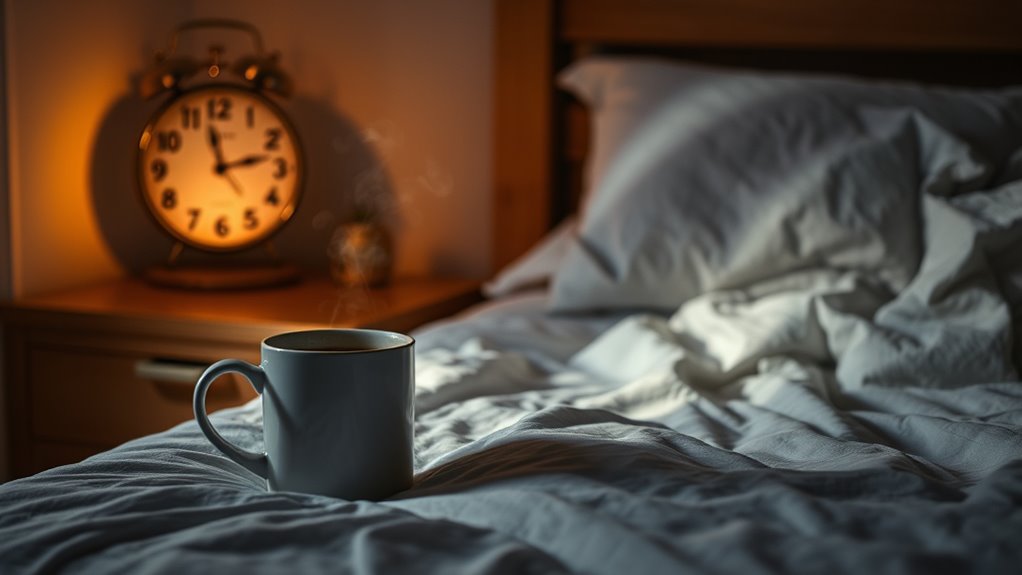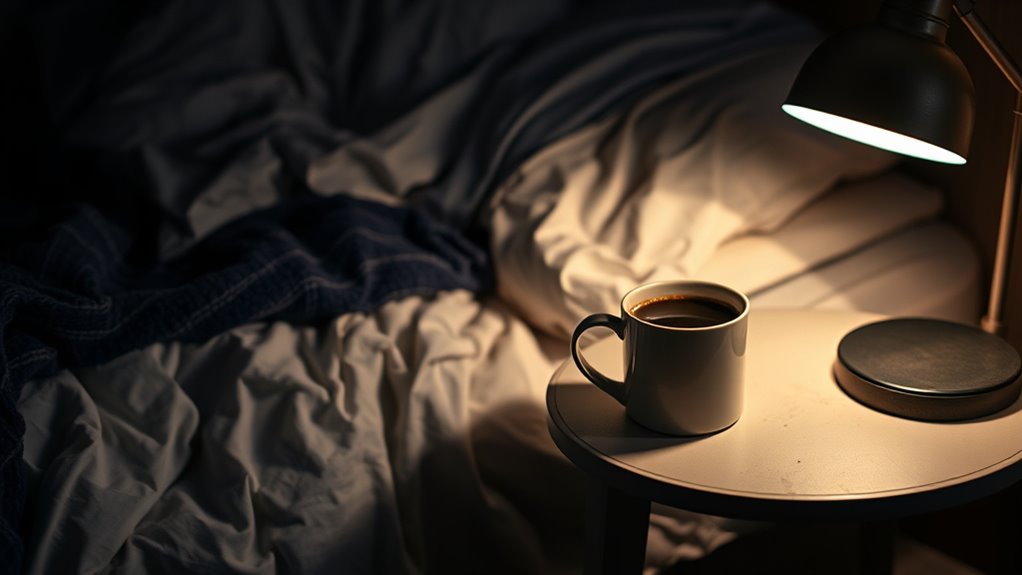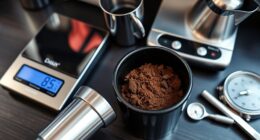To avoid disrupting your sleep, it’s best to stop drinking coffee at least 8 to 13 hours before bedtime, depending on how sensitive you are. Consuming caffeine later than six hours before sleep can delay your sleep onset and reduce overall sleep time by up to 45 minutes. If you keep late-night caffeine habits, your sleep quality may suffer considerably. Continue exploring to discover more tips on balancing your caffeine intake with healthy sleep.
Key Takeaways
- Consuming coffee less than 8-13 hours before sleep can significantly disrupt sleep quality and duration.
- A standard coffee (~107 mg caffeine) should be avoided after approximately 9 hours before bedtime.
- Pre-workout supplements (~217 mg caffeine) require at least 13 hours to minimize sleep disturbance.
- Individual sensitivity and metabolism influence how late caffeine affects your sleep.
- Switching to decaf or herbal teas in the late afternoon can help promote better sleep hygiene.

Ever wondered how your daily coffee habit might be affecting your sleep? Caffeine is a stimulant that can considerably impact your sleep duration and quality, even if you don’t realize it. Research shows that drinking caffeine can cut your total sleep time by about 45 minutes and decrease your sleep efficiency by roughly 7%. You might wake up more during the night, with about 12 extra minutes of wakefulness after initially falling asleep. Light sleep stages tend to increase slightly by six minutes, while deep sleep diminishes by around eleven minutes and 1.4% of your overall sleep proportion. These changes can leave you feeling less rested, even if you’re unaware of how disrupted your sleep has become. Timing plays an essential role. For example, if you consume a standard cup of coffee with about 107 mg of caffeine, it’s best to do so at least 8.8 hours before you plan to sleep. Having coffee later than that could still interfere with your rest. Pre-workout supplements containing roughly 217.5 mg of caffeine should be taken at least 13.2 hours before bed to minimize disruption. Consuming caffeine even six hours prior to sleep—regardless of dosage—can cause notable disturbances, including longer time to fall asleep by about nine minutes and reduced sleep satisfaction. Afternoon caffeine intake after 5 p.m. is generally not recommended for sensitive individuals. Your subjective feeling of sleepiness mightn’t reflect the true quality of your sleep. You may feel tired, but objective measures reveal fragmented sleep, with increased wakefulness and lighter sleep stages. Surprisingly, caffeine reduces melatonin metabolites at night, which can further delay sleep onset and make it harder to feel rested. Additionally, sleep architecture can be altered by chronic caffeine use, as seen in animal studies, potentially affecting brain blood flow during sleep and leading to longer-term health consequences. The dose matters. Moderate to large doses, like those found in energy drinks or four cups of coffee (around 400 mg), cause the most profound disruptions. Lower doses still reduce total sleep time but to a lesser extent, and individual differences in caffeine metabolism influence how severely your sleep is affected. If you already carry a sleep debt or are subjected to external factors such as noise or artificial light, caffeine’s disruptive effects can compound. Smoking, age, and diet also interact with caffeine, making sleep even more unpredictable. Additionally, caffeine withdrawal symptoms can indirectly degrade sleep quality, creating a cycle where poor sleep leads to more caffeine consumption. To protect your sleep, aim to avoid caffeine at least 8 to 13 hours before bedtime, depending on your sensitivity and intake level. Consider switching to decaf or herbal teas after midday if you notice sleep issues. Monitoring your sleep quality—both subjective feelings and objective data—can help you gauge your personal tolerance. Prioritize good sleep hygiene by keeping your bedroom dark and quiet, and be aware that genetic factors may influence how quickly you metabolize caffeine, guiding you to better timing decisions.
Frequently Asked Questions
Does Decaffeinated Coffee Affect Sleep Quality?
Decaf coffee generally doesn’t affect your sleep quality because it contains minimal caffeine. If you drink it early in the day, it’s unlikely to disrupt your sleep, even if you’re sensitive.
However, some individuals with heightened sensitivity or genetic differences might experience slight sleep disturbances.
Keep in mind that additives or drinking multiple cups could impact your sleep indirectly.
Can Drinking Coffee Early in the Morning Disrupt My Sleep?
Drinking coffee early in the morning usually won’t disrupt your sleep unless you consume it in large amounts or very close to bedtime.
However, caffeine can still affect your sleep quality by delaying melatonin release and increasing light sleep stages.
To minimize impact, it’s best to finish your coffee at least 8-9 hours before bed, especially if you’re sensitive to caffeine or have sleep issues.
How Does Caffeine Tolerance Influence Sleep Patterns?
Caffeine tolerance means your body adapts to regular intake, so initially, it might disrupt your sleep, but over time, you may notice fewer effects.
Still, your sleep can be affected if you consume high doses or late in the day, especially within three hours of bedtime. Even with tolerance, high doses or late caffeine can delay sleep onset.
Are There Sleep Benefits From Avoiding Coffee Altogether?
Think of avoiding coffee as turning off a noisy, disruptive alarm. When you skip caffeine, you quiet the overstimulating buzz, allowing your sleep to settle peacefully like a calm lake.
You’ll notice better sleep onset, deeper restorative stages, and fewer disturbances. Without caffeine’s interference, your natural sleep cycle can flourish, leading to improved mood, reduced anxiety, and better overall health—making every night a tranquil voyage toward renewal.
How Do Different Coffee Brewing Methods Impact Caffeine Levels?
Different brewing methods considerably impact caffeine levels in your coffee. Espresso packs the most caffeine per ounce because of high-pressure extraction, while drip coffee offers moderate amounts, and French press results in higher overall caffeine due to longer steeping.
Cold brew, with its extended steeping time, can have a high caffeine content in larger servings. Your choice of method affects how much caffeine you consume, influencing your alertness and sleep.
Conclusion
As the sun dips below the horizon, your caffeine-fueled day begins to fade into the night’s gentle embrace. Drinking coffee too late is like tossing pebbles into a still pond—disrupting the calm and sending ripples through your sleep. To guard your rest, listen to your body’s quiet whispers. Let your evening cup be a warm glow, not a thunderstorm, so you can drift into peaceful slumber and wake refreshed with the dawn’s first light.









